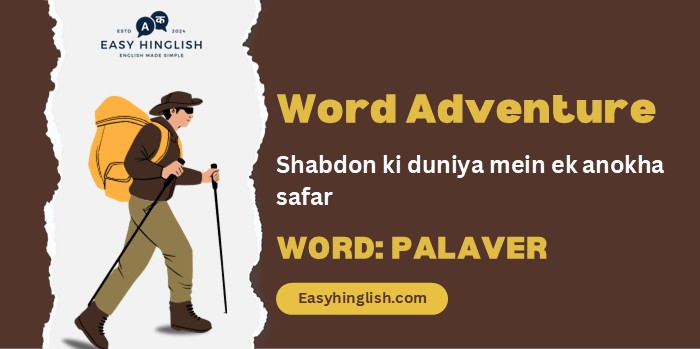Word Adventure: Palaver
The Headline
“Trade Talk Se Idle Chatter Tak: ‘Palaver’ Ki Global Journey”
The Scoop
English vocabulary ki vibrant tapestry mein, kuch words arrive karte hain through unexpected routes, carry karte hue apne saath echoes of cultural exchanges aur historical encounters. ‘Palaver’ ek aisa hi linguistic traveler hai – ek term jo journey kar chuka hai Portuguese trading posts in Africa se everyday English conversation tak. Join karo mujhse jaise hum unravel karte hain story of this word jo utna hi kehta hai human communication ke baare mein jitna colonial history ke baare mein.
Let’s Break It Down
The Plot Thickens
‘Palaver’ ki story begin hoti hai Portuguese word “palavra” se, jiska matlab simply “word” ya “speech” hai. Jab Portuguese traders ne establish kiye outposts along West African coast 15th aur 16th centuries mein, “palavra” ban gaya crucial term un negotiations aur discussions ke liye jo facilitate karte the trade between Europeans aur Africans.
Is colonial context mein, “palaver” refer karta tha conferences ko between European traders ya officials aur local African leaders. Ye meetings often lengthy affairs hote the, involving elaborate protocols, interpreters, aur extensive negotiation. Ye term adopt hua various pidgin languages mein along African coast aur eventually made its way into English through British colonial officials aur traders 18th century mein.
Jo fascinating hai ‘palaver’ ke baare mein wo hai ki kaise iska meaning shift hua over time. Initially describing important formal discussions se, ye gradually acquire kiya more dismissive connotation English mein, often referring to unnecessarily prolonged ya pointless talk. Ye semantic drift reflect karta hai cultural biases of colonial powers, jo sometimes view karte the African diplomatic traditions ko as overly time-consuming ya inefficient compared to European practices.
Kuch African contexts mein, however, ye term retain karta tha apna more respectful meaning. Parts of West Africa mein, ek “palaver hut” tha (aur sometimes still hai) designated meeting place jahan community discussions aur conflict resolution take place – highlighting ki kaise same word carry kar sakta hai different values in different cultural settings.
Word in the Wild
The Twist
Yahan ek thought-provoking aspect hai ‘palaver’ ka: While contemporary English mein ye often carry karta hai dismissive tone suggesting worthless chatter, anthropologists ne note kiya hai ki cultures with traditions of extended dialogue (jaise jo gave us this word) often value karte hain thorough discussion ko as essential to building consensus aur maintaining social harmony. Jo ek culture dismiss kar sakti hai as “just palaver” wo ho sakta hai doosre ki crucial conflict resolution mechanism. Ye remind karta hai humein ki communication styles deeply cultural hain, aur jo seem karta hai inefficient in one context wo ho sakta hai highly effective in another. Perhaps next time jab tum kisi meeting mein ho jo feel kar rahi hai ki nowhere ja rahi hai, consider karo whether ye might be necessary “palaver” jo build kar raha hai relationships aur consensus in ways not immediately apparent!
Make It Stick
Palaver: Jab baat scenic route leta hai expressway ki jagah!
Your Turn
Socho kisi time ke baare mein jab tumne experience kiya ho jo seem karta tha unnecessary palaver apni professional ya personal life mein. In retrospect, kya us extended discussion ne serve kiya koi purpose jo obvious nahi tha at the time? Ya consider karo cultural differences jo tumne notice kiye hain communication styles mein – kya tumne encounter kiye hain situations jahan jo seem karta tha excessive talk to some wo considered tha proper aur necessary by others? Share karo apni palaver experiences comments mein below, aur let’s explore karo ki kaise different communication styles shape karte hain hamare interactions!
Down the Rabbit Hole
- Curious ho other words ke baare mein jo entered English through colonial encounters? Look into terms jaise ‘juggernaut’, ‘bungalow’, ya ‘zombie’.
- Interested ho traditional African decision-making systems mein? Research karo concepts jaise palaver hut, traditional village councils, ya consensus-building practices in various African societies.
- Want to explore ki kaise communication styles differ across cultures? Dive into concepts jaise high-context versus low-context communication, polychronic versus monochronic time orientation, ya direct versus indirect speech patterns.
The Last Word
Jaise hum conclude karte hain apni exploration ‘palaver’ ki, main hope karta hoon ki tumne appreciation gain ki hai is word ke liye jo traveled hai itna far aur changed hai itna much along the way. Ye remind karta hai humein ki language, like culture, constantly evolve kar rahi hai through human interaction aur exchange. Next time jab tum find yourself engaged in jo seem karta hai excessive talk, perhaps tum pause karoge consider karne ke liye whether tum experience kar rahe ho valuable tradition of palaver jo deserves more respect than our fast-paced world typically allow karta hai. Until our next word adventure, ye hai Prashant from Wordpandit, encouraging kar raha hoon tumhein embrace karne ke liye occasional palaver ko as opportunity for deeper connection rather than waste of precious time!








